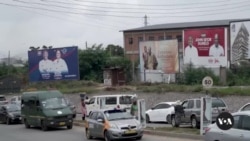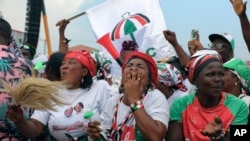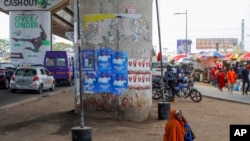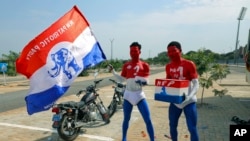Former Ghanaian President John Mahama is one of the main challengers of ruling party candidate Mahamudu Bawumia in the West African nation’s December 7 national elections.
If he wins, Mahama vows to cultivate a 24-hour business environment to bolster job creation and improve an economy recovering from a $30 billion external debt default in 2022. Bawumia, the current vice president, says despite the recent woes associated with the post-COVID pandemic and some internal pressures he too is committed to strengthening the economy.
Candidates
Since 1992, the country has been governed by either the National Democratic Congress or the New Patriotic Party, and that is not likely to change, University of Ghana senior lecturer Kwame Asah Asante told VOA.
“It’s the dominant parties; one of them is going to carry the day. … From 1992 up to 2020, the minor parties, if you put all their performance together, on average … they have not gone up to 5%. ... But it’s also true … if they can hit more than 4% of their strength … they are able to push the election to a second round.”
On the streets of the capital, Accra, billboards of the various candidates in the December presidential election are everywhere, and voters’ excitement is palpable.
Some say they are tired of the two parties and have not decided yet for whom they’ll vote.
“Since 1992 to this year, we haven’t changed parties … every day it’s NPP NDC … we want [to] change to [a] different party so that we would see more improvements,” Angela Ofori, an undecided voter told VOA.
John Taden, an international political economist and an assistant professor of international studies at Pepperdine University in Los Angeles, said that outside the main two political parties, there are newcomers that “appear to be exciting to the youth … [Nana] Kwame Bediako also known as Cheddar. He’s popular…but he hasn’t gained that much ground to make an impact in the outcome of the election…the best he can do this time might be to force a runoff.”
The 44-year-old Bediako who calls himself a visionary is running as an independent candidate. In addition to focusing on improving the everyday lives of Ghanaians, the vision in his manifesto includes developing "eco-friendly policies that ensure Ghana’s progress is not only economically sound but also environmentally responsible."
Issues/economy
Ghana is the second largest cocoa producer in the world according to the United Nations Development Program, but the country defaulted on most of its $30 billion external debt in 2022 after the effects of years of borrowing were made worse by the global impact of the COVID-19 pandemic.
The grain supply disruption caused by the war in Ukraine also had its effects. It triggered a shortage of about 30 million metric tons of grain in Africa in the first year of the war alone, according to the Atlantic Council, a policy research organization based in Washington.
Asante said there are many critical issues at stake in this year’s elections, including infrastructure development, health, education, corruption, and unemployment, but many voters are zeroing in on one matter.
“The economy will play an important role because it’s a bread-and-butter issue; we’ve seen time and again that anytime you have a very difficult economy, campaigning becomes difficult for the government of the day,” he said.
A view echoed by Taden.
“In the U.S., we saw [President-elect Donald] Trump come back to power because of inflation and, in Ghana, inflation at some point was at a historic 54% over the last 18 months …but domestically, they have faced a lot of sustained protests over illegal mining, a crisis that has taken place in the south, where people without mining licenses have engaged in consistent destruction of the environment without any government oversight or restriction,” Taden said.
Illegal mining, known locally as “galamsay”, is affecting forest cover and arable land for agriculture purposes, and now poses a serious threat to the cocoa production, Asante said.
These issues have pushed some voters, such as Wisdom Gavor and Janet Bawah, to say they will not vote for the current government. Instead, they want Mahama, the former president who has made a comeback and promises a 24-hour economy.
“Currently we are using a one shift system. So, if the 24-hour economy comes, it’s going to be three shifts. For example, a hundred staff is working in one organization, so if the 24-hour economy comes, it’s going to be 300 staff,” Gavor said.
“The suffering is too much for us … today you go to buy this, the price is different. The next day, different prices. So, we want a change in the system,” Bawah told VOA.
Others say they will stick with the ruling NPP candidate and current Vice President Bawumia, giving him full credit for some of the policy changes his party brought to the country.
“One policy I am very happy about is the digitization policy. … This policy is about creating jobs online, making everything more accessible and taking it away from the traditional ways of doing things, to the modern way,” NPP voter Ivan Duke told VOA.
Taden agreed with that assessment saying “Dr. Bawumia is called Mr. Digital because he did promise to digitize the Ghanaian economy and to some extent he has delivered on a lot of those promises. He has introduced some digitization into the health sector and to government operations that have created a lot of efficiency. They have eliminated some backlogs in some government operations and some ghost names in government payrolls.”
Ghana is generally viewed as a stable democracy in a region plagued by coups. Despite some polls suggesting the results could sway one way or the other, this year’s election is expected to be highly competitive.








